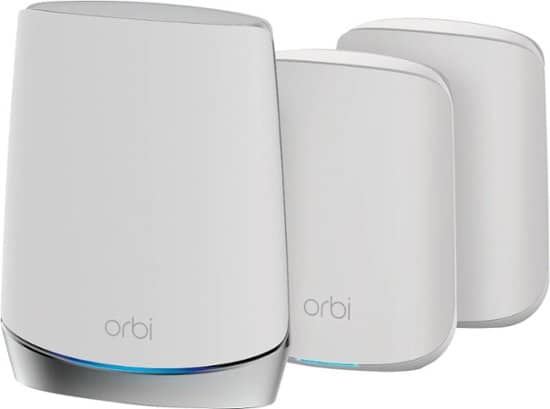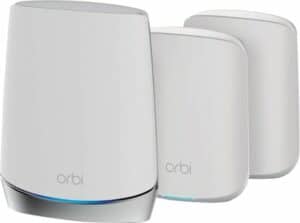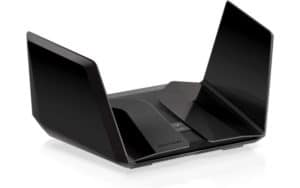Best Netgear Routers (Gaming & WIFI 6)

If your current router is feeling the strain from the glut of wireless devices from phones and laptops to TVs by way of smart fridges that now depend on a home network, then a router upgrade may be in order. Among the leading manufacturers of home networking solutions, Netgear is among the most recognized and well respected. The name is synonymous for many with a networking powerhouse and the very best routers money can buy.
With no shortage of options to choose from, finding the right Netgear router can be challenging. The company has multiple models for virtually every scenario, use, and home, from budget dual-band workhorses to costly, high-performance routers boasting the most cutting-edge wireless features such as support for the Wi-Fi 6 and 6E standard.
If trawling through Netgear’s line-up leaves you despondent and you need pointing in the right direction, you’ve come to the right place. In our guide, we’ll be highlighting some of the best Netgear routers around. These are all sure to inject some much-needed speed, range, and stability into your aging home network.
Products at a Glance
Things to consider
When hunting down the best Netgear routers, we paid close attention to several key specifications: Wi-Fi standard, range, on-router ports, antennas, theoretical speeds, and integrated technologies. We scrutinized these factors when assessing each router, favoring those that incorporate a well-rounded balance of these as well as reliable real-world performance.
In the end, we whittled down our selection to five recommendations that, in our opinion, tick all the right boxes. We know that not everyone uses a home network in the same way. As such, we’ve tried to incorporate recommendations suitable for the most popular uses, such as gaming, and general day-to-day tasks like browsing and video streaming. Similarly, you’ll also find picks covering a range of budgets from cheap and cheerful options to top-of-the-pile, performance-oriented routers.
Read on to find a brief review of each, pinpointing why they are worth integrating into your home network. Let’s jump in.
Product Reviews
- Wi-Fi 6E
- Impressive mesh system
- Expensive
The Netgear Orbi Wi-Fi 6E is the most impressive WiFi 6E Netgear system currently on the market. Its mesh system is capable of creating four individual networks – 2.4 GHz, 5-GHz and 6 GHz, which are distributed by 12 high-power antennas in each unit. Its range is optimized by the latest WiFi 6 technology – including beamforming and MU-MIMO, making it an incredibly powerful and efficient long-range Wi-Fi 6E router.
Netgear provides users with an incredibly user-friendly interface that makes it very easy to manage the mesh system. This can be controlled over on the web interface, or the app. Whilst the Netgear Orbi Wi-Fi 6E is arguably the most impressive and advanced router on the market in regard to its range, it comes at an incredibly high price and is definitely unaffordable for most. Regardless it tops our list of the best Netgear routers.
- Wifi 6E
- Sleek design
- Expensive
The Netgear Nighthawk RAXE500 is one of the leading WiFi 6E routers Netgear has to offer. With WiFi 6E technology, the RAXE500 is capable of incredibly fast wireless speeds. This router is steps ahead of the game with support for 2.5 Gigabit/sec ethernet speeds. It’s fair to predict that 2.5 Gigabit/sec ethernet support will be a common feature we’ll see popping up on new routers in the future.
Whilst the Netgear Nighthawk RAXE500 is a very advanced router, its interface is user-friendly nonetheless, and the setup is fairly straightforward. You can set up the Netgear RAXE500 through your mobile device by using the Nighthawk app. Further, advanced network settings can then be tweaked on the web interface. The RAXE500 does not offer any form of parental control, however, it does feature a robust security system – Netgear Armor. Netgear Armor automatically blocks suspicious connections, scans devices for vulnerabilities, and provides excellent malware protection. The Netgear Nighthawk RAXE500 is incredibly high performing and sits comfortably on our list of the best Netgear routers.
- Wi-Fi 6
- Gaming-specific OS and features
- Theoretical speeds up to 5.4 Gbps
- Superb stability
- Prohibitive price
- Security subscription (after free trial) adds to the cost
The Netgear Nighthawk Pro XR1000 is a beastly Wi-Fi 6 router designed specifically for gaming thanks to a purpose-built OS, features, and plenty of speed to boot.
The router features six streams with theoretical speeds up to 5.4 Gbps – 600 Mbps on the 2.4 GHz band and 4,800 on the 5 GHz band. On the Wi-Fi 6 front, the Netgear Nighthawk Pro XR1000 includes 160 MHz channel support for up to 4.5 times the performance of Wi-Fi 5 routers. Naturally, you’ll need Wi-Fi 6 compatible devices to benefit from these blisteringly fast speeds.
On the gaming side of things, the Netgear Nighthawk Pro XR1000 runs the DumaOS 3.0 operating system. The OS features a trove of gaming-specific features, including geofencing to filter game servers, a ping heatmap, connection benchmarks, QoS bandwidth allocation to prioritize gaming devices, and a traffic blocker to prevent unwanted network activity hogging bandwidth. When combined, these features work to reduce latency and offer a more stable ping.
More standard tech like Beamforming +, MU-MIMO, and Smart Connect further boost the router’s stability. The range is equally impressive, and the Netgear Nighthawk Pro XR1000 confidently carves a path through the densest home layouts.
Other features include four Gigabit Ethernet ports, a triple-core 1.5 GHz CPU, four powerful antennas, and one USB 3.0 port. Like other Netgear routers, the Netgear Nighthawk Pro XR1000 features Netgear Armor for added security, although in the context of an already expensive piece of kit, this is somewhat of a letdown given the need to pay for a subscription once the month-long free trial runs out.
This is Netgear’s best offering for a gaming router, but to see how it stacks with others on the market at the moment check our top picks for the best gaming routers out right now.
- Theoretical speeds up to 2.6 Gbps
- Gaming OS and features
- Beamforming QoS, and MU-MIMO
- No Wi-Fi 6
- Price
For those that aren’t worried about Wi-Fi 6 support quite yet, the Netgear Nighthawk Pro XR500 is easily one of the better gaming-oriented routers that Netgear makes.
You’ll find many of the same gaming-specific features as the more expensive Netgear Nighthawk Pro XR1000, and these work just as well on the 802.11ac Wi-Fi 5 standard. These include the DumaOS, a customizable gaming dashboard to track bandwidth, ping, wireless status, traffic prioritizing, QoS, network analytics to track down bandwidth-hungry devices, and the same geofiltering utility that hones in on the best servers.
In terms of specifications, the Netgear Nighthawk Pro XR500 sports dual-band Wi-Fi, four data streams per band to maximize speeds and stability, MU-MIMO, Beamforming +, four high-performance external antennas, and theoretical speeds up to 2.6 Gbps, 800 Mbps on the 2.4 GHz band and 1733 Gbps on the 5 GHz band.
The Netgear Nighthawk Pro XR500 doesn’t include Netgear Armor but is nevertheless decently equipped for security with VPN support through the OpenVPN connect app and WPA/WPA2. On the unit, there are four Gigabit Ethernet ports to connect consoles and multiple desktop gaming rigs, as well as two USB 3.0 ports for media sharing across the network.
Despite the lack of Wi-Fi 6 support, the Netgear Nighthawk Pro XR500 still necessitates a considerable investment compared to more general use routers on Netgear’s roster. As such, we recommend only taking the plunge if you genuinely need a decked-out gaming router with all the bells and whistles.
Wi-Fi Standard
As a rule of thumb, we recommend opting for routers that support the 802.11ac Wi-Fi 5 standard. Widespread compatibility with most devices and speeds that won’t be surpassed by most ISP internet speeds make Wi-Fi 5 suitable for most homes.
Those looking to future-proof their router may want to choose one of the growing number of routers integrating support for the new 802.11ax Wi-Fi 6 standard. However, it’s worth noting that device support (phones, PCs, laptops, etc.) is relatively slim, and the standard does command a premium.
Range
A typical router has a Wi-Fi range anywhere from 50 to 150 feet depending on the band used, the router’s placement, the layout of the home, and obstructions such as thick rock walls. For most homes, this is more than sufficient for a strong, reliable signal throughout. But, larger homes may suffer from dead zones, in which case we recommend routers with more ample range or looking into Wi-Fi extenders or, better, a mesh network.
Speed
While the speeds advertised by router manufacturers chart ever higher, including Netgear’s, these numbers are only theoretical. The actual speeds you’ll experience using a home network vary greatly depending on the speed offered by your ISP, the brick and mortar design of your home, and the top speeds supported by your modem. Choosing the right modem and router combination can drastically increase your internet speeds and reliability.
It’s easy to get bogged down in advertised speeds, but in reality, the overwhelming majority of routers have theoretical speeds that surpass most, if not all, those offered by ISPs. For example, in the UK average broadband speed sits at around 50 to 60 Mbps, while in the US, the figure is roughly 130 Mbps. An AC3200 router (i.e., speeds up to 3200 Mbps), for example, is overkill for all but the most demanding setups and speediest ISP internet plans.
Connectivity
Routers aren’t just about establishing a fast and reliable wireless connection. Certain situations, such as multiplayer gaming, benefit from a traditional wired Ethernet connection. Most routers come with at least one or two Ethernet ports as standard, but if you plan to hook up multiple devices via Ethernet (smart TV, PC, console, printer, etc.), make sure there are sufficient ports before committing to a purchase.
Similarly, some routers include USB ports, ideal for hooking up external storage to share files, documents, media, and the like across a home network at fast speeds. These are less common so don’t just buy expecting a USB port as you would an Ethernet port and research specifications beforehand.
Our Verdict

Best Netgear Routers (Gaming & WIFI 6)
The Netgear Orbi 960 Series is a phenomenal WiFi router. With all the latest Wifi 6E capabilities, and an incredibly sleek and inoffensive design, the Netgear Orbi 960 is currently unmatched in the router market. Its impressive mesh capabilities are something to bear in mind too.





